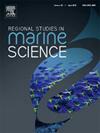通过开发预防管理和紧急应对污染模式,对石油污染进行识别和分级:波斯湾北岸特大港口案例研究
IF 2.1
4区 环境科学与生态学
Q3 ECOLOGY
引用次数: 0
摘要
油类污染仍然是海上运输面临的一项严峻的环境挑战,对海洋生态系统和沿海社区造成严重影响。本研究调查了伊玛目霍梅尼港装卸码头的油类污染事件,旨在开发一种全面的预防和应急响应管理模式。我们对环境成分,特别是总石油碳氢化合物(TPHs)进行了全面评估,并利用 "与理想解决方案相似度排序技术"(TOPSIS)对风险进行识别和优先排序。主要发现揭示了四种紧急污染情况,突出了需要立即干预的关键领域。我们的分析强调了有效应急计划的基本议程项目,其中环境资源保护和事故前责任分配的得分分别为 4.4 和 4.35。此外,麦肯锡的差距分析确定了应急计划的七个战略重点,表明在战略(1.65)和技能(1.75)方面存在严重不足,显示出危机准备不足。这些结果表明,亟需为减轻石油污染风险量身定制一个强有力的应急响应模式。通过解决已发现的差距,本研究为加强港口环境管理实践提供了一个战略框架,从而促进波斯湾地区更可持续的运营。最终,我们的研究结果倡导包括国家和国际组织在内的利益相关者共同努力,实施严格的环境政策和有效的监控系统,以保护海洋环境免受石油污染。本文章由计算机程序翻译,如有差异,请以英文原文为准。
Identification and ranking of oil pollution by developing a preventive management and emergency response model against pollution: A case study of a mega port on the northern coast of the Persian Gulf
Oil pollution remains a critical environmental challenge in maritime transportation, significantly impacting marine ecosystems and coastal communities. This study investigates oil pollution incidents at the loading and unloading docks of Imam Khomeini Port and aims to develop a comprehensive prevention and emergency response management model. We conducted a thorough evaluation of environmental components, specifically Total Petroleum Hydrocarbons (TPHs), and utilized the Technique for Order of Preference by Similarity to Ideal Solution (TOPSIS) to identify and prioritize risks. Key findings revealed four emergency pollution scenarios, highlighting critical areas that require immediate intervention. Our analysis underscored essential agenda items for effective emergency response planning, scoring 4.4 for environmental resource conservation and 4.35 for pre-incident responsibility assignment. Furthermore, a McKinsey Gap Analysis identified seven strategic priorities for the emergency response plan, indicating substantial weaknesses in the strategy (1.65) and skills (1.75) dimensions, demonstrating inadequate crisis preparedness. These results emphasize the urgent need for a robust emergency response model tailored to mitigate oil pollution risks. By addressing identified gaps, this study provides a strategic framework for enhancing environmental management practices at the port, fostering more sustainable operations in the Persian Gulf region. Ultimately, our findings advocate for collaborative efforts among stakeholders, including national and international organizations, to implement rigorous environmental policies and effective monitoring systems to safeguard marine environments against oil pollution.
求助全文
通过发布文献求助,成功后即可免费获取论文全文。
去求助
来源期刊

Regional Studies in Marine Science
Agricultural and Biological Sciences-Ecology, Evolution, Behavior and Systematics
CiteScore
3.90
自引率
4.80%
发文量
336
审稿时长
69 days
期刊介绍:
REGIONAL STUDIES IN MARINE SCIENCE will publish scientifically sound papers on regional aspects of maritime and marine resources in estuaries, coastal zones, continental shelf, the seas and oceans.
 求助内容:
求助内容: 应助结果提醒方式:
应助结果提醒方式:


